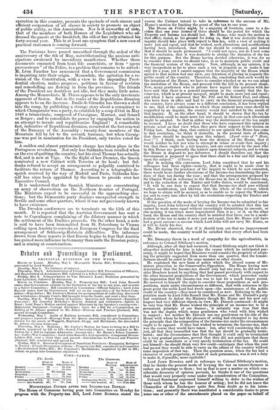The Parisians have passed unscathed through the ordeal of the
anniversary of the 4th of May, notwithstanding the anxious anti- cipations awakened by incendiary, manifestoes. Whether those documents emanated from bona fide anarchists, or from " agens provocateurs " of the Police, is a problem that remains to be solved : M. Leon Faucher has announced that a Government commission is inquiring into their origin. Meanwhile, the agitation for a re- vision of the Constitution, with a view to the impending Presi- dential election, makes progress ; petitions in favour of revision and remodelling are flowing in from the provinces. The friends of the President are doubtless not idle, but they make little noise. Among the Monarchists, M. Thiers appears to be the only inveterate opponent of fusion. But in the ranks of the Republicans disunion appears to be on the increase. Emile de Girardin has thrown a shell into the camp, by publishing a strange story about a conspiracy to which Changarnier was a party, to establish by a coup d'etat in May 1848 a triumvirate, composed of Cavaignac, Marrast, and Senard or Berger ; and to consolidate its power by engaging the nation in an attempt to invade and republicanize England ! A remarkable fact, indicative of Republican disunion, occurred at the last renewal of the Bureaux of the Assembly : twenty-four members of the Mountain fell by lot to the seventh bureaux, but when Cavaig- nac was put in nomination for its President, only twelve voted for him.
A sudden and almost pantomimic change has taken plane in the Portuguese revolution. Not only has Saldanha been recalled when on the eve of quitting the country, but his rival Thomar has actually fled, and is now at Vigo. On the flight of her Premier, the Queen nominated a new Cabinet with Terceira at its head ; but Sal- danha refused to accept an arrangement so palpably contrived to facilitate the return of Thomar. According to a telegraphic de- spatch received by the way of Madrid and Paris, Saldanha him- self has since been appointed by the Queen to preside over her Executive Council.
It is understood that the Spanish Ministers are concentrating an army of observation on the Northern frontier of Portugal. The Ministers expect to be successful in the approaching elec- tions; but the Democratic party displays unexpected strength in Seville and some other quarters, where it was not previously known to have existence.
The Dresden conferences are to terminate on the 15th of this month. It is reported that the Austrian Government has sent a note to Copenhagen complaining of the dilatory manner in which the settlement of the Duchies proceeds. On the other hand, a note is said to have been transmitted from St. Petersburg to Vienna calling upon Austria to convoke an European Congress for the final arrangement of Schleswig-Holstein difficulties. The inference drawn from these reports is that Russia begins to fear that Austria has gained more influence in Germany than suits the Russian policy, and is aiming at counteraction.


























 Previous page
Previous page